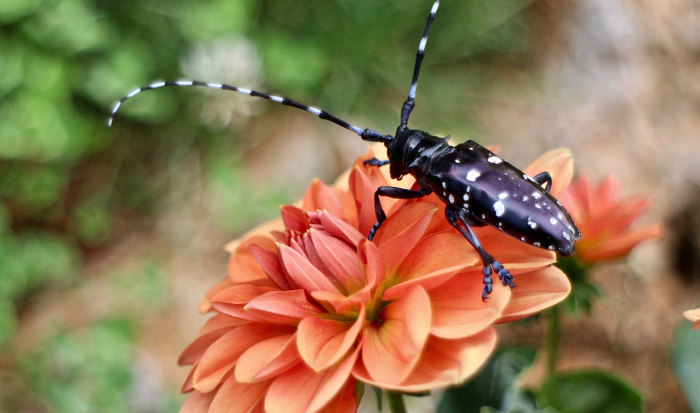
In honor of Earth Day, QCC's Environmental Science program once again hosted a talk to celebrate the day, which occurs each year on April 22. The day was developed to spread awareness of the need to protect the earth's natural resources. On April 20, guest speaker Teresa Wolcott spoke to the QCC community about invasive insects in Massachusetts.
Wolcott is a plant protection and quarantine technician with the Animal and Plant Health Inspection Service (APHIS), which is a part of the United States Department of Agriculture. She works with the Asian longhorned beetle eradication program in which she has collaborated with the Massachusetts Department of Conservation and Recreation and the Massachusetts Department of Agricultural Resources.
Several towns in Central Massachusetts, including Worcester, were infested with Asian longhorned beetles in 2008 and APHIS has been working to contain and mitigate the infestation ever since.
Wolcott noted that it's important to eradicate the Asian longhorned beetle because they are a major threat to many types of hardwood deciduous trees like maple, poplar and ash. When a tree becomes infested, it becomes structurally unsound and becomes a hazard. This has a detrimental effect on the loss of habitat for wildlife, windbreaks, carbon sinks and water quality. Tree loss can also negatively affect tourism and other economic industries.
Wolcott referenced the Burncoat neighborhood in Worcester which had a massive loss of trees during the infestation period. When a tree is infested, she said, it has to be taken down and ground into chips and the stump must be ground down 8 inches below the surface.
While the track record of eradication in Worcester County has been very successful and no infested trees were found in 2022, Wolcott stressed the importance of keeping tabs on invasive species. She showed several examples of egg sites on trees and how they can be identified as round holes about the size of a dime. The female beetle digs a single site for each egg and can lay anywhere from 30 to 90 eggs.
"They are very destructive. Please call if you see something that looks like an infestation," said Wolcott, adding that if you see the Asian longhorned beetle or egg sites you can call 508.852.8090 or fill out a form on the APHIS website. She noted that members of the public were often the first people to find the trees so it's important for her organization to do outreach.
There are also new invasive species in the area that APHIS is keeping an eye on such as the emerald ash borer and the spotted lanternfly. A student asked how they can get involved and Wolcott replied, "Work for us! Many of these organizations are hiring."
For more information contact Coordinator of Liberal Arts-Environmental Science Option Program Anita Soracco at asoracco@qcc.mass.edu.
